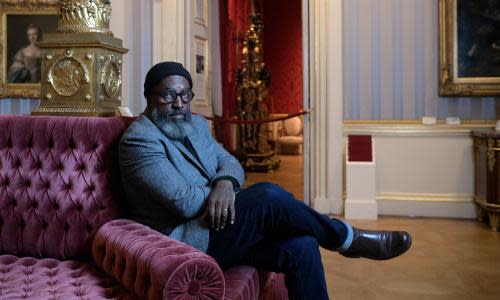Roger Robinson: 'I read Chris Rock's memoir on a flight, tears of laughter streaming down my face'

The book I am currently reading
About 10 years ago I was recommended a Colum McCann’s Dancer but I never got around to reading it. That is why I was glad to finally read his new book Apeirogon – and what a book it is. A fiction based on real characters, politics and lives, it is a hybrid that tests the boundary of what a novel can be. What I like about it most is the way in which its multivoiced perspectives hold so much poetry, music and imagery.
The book that changed my life
Sassafrass, Cypress & Indigo by Ntozake Shange is a strange bricolage of a book that includes menus, spells, recipes and journal entries. It allowed me to connect with what’s magical in my own community, and showed me that a novel can comment on art, be politicised and also magical. Its voice was so unique and had nothing to do with industry or trends. The book also gave me a clear picture about the struggles involved with living by your art.
The book I wish I’d written
Written as a novel in verse with a semi-autobiographical slant, Lara, by Bernardine Evaristo, explores generations of family and how tough their lives were in London in the 1960s and 70s.
The book that had the greatest influence on my writing
Progeny of Air by Kwame Dawes won best first collection at the Forward poetry prize in 1994. The event was televised and a young writer (me) saw a black man winning a major award. The next day, I bought the book and found out that he was teaching that week in Brixton. His account of his childhood in the 70s introduced me to the idea of empathy in poems and this idea remains central to my writing. The workshop I took with him was to begin a lifelong mentorship that continues today.
The books I think are most underrated
Pepper Seed by Malika Booker and The Zoo Father by Pascale Petit. Common to both titles is the struggle to survive in the face of repeated trauma. It is clear that the catharsis of writing is an important part of both of their processes.
The Brothers Karamazov by Dostoevsky: 739 pages. Enough said.
The book that changed my mind
More Brilliant Than the Sun by Kodwo Eshun is essentially a book about music but also much, much more. He makes the assertion that the arc of invention in black music may not be related to history but more related to experimentalism and sonic adventure assisted by technology.
The last book that made me cry
The Winged Seed, a very tender and moving book about family by Li-Young Lee. Apparently it was contracted as a novel. I can see how the publisher could see this as a book-length lyric poem. It weaves in and out of history, intimacies, generational sins and secrets, political oppression and immigration. In an interview, Lee said he had become focused on writing it within a single night. Every night he would start again from the beginning – it took him 14 years to complete it.
The last book that made me laugh
I was never a fan of Chris Rock’s standup comedy. However, I found myself in an airport, bought Rock This! on a whim and read it on a flight to New York. For the whole journey tears of laughter streamed down my face.
The book I couldn’t finish
The Brothers Karamazov by Dostoevsky: 739 pages. Enough said.
My earliest reading memory
I read Chinua Achebe’s Things Fall Apart in my first year of secondary school. It was the first time that reading became more important than everything else I was doing at the time. It also introduced me to rituals and traditions that were not Christian but were strangely familiar to me.
My comfort read
I was introduced to Banana Yoshimoto’s Kitchen by fellow poet Samantha Coerbell. She was really into cooking and she knew I was into food and food culture. It’s also a book about subculture and making a new family and love.
The book I’m ashamed not to have read
Ben Okri’s The Famished Road. I know, I know. Don’t judge me.
The book I give as a gift
I was late to Toni Morrison and picked up Sula after fellow poet Peter Kahn said it was his favourite book. It is the only book I’ve ever read in one day from beginning to end. It is the first novel that I saw my aunts, mum, and sisters in. Not in a metaphorical sense but I actually saw them. Sula was my Aunty Lynette extracting choice from choicelessness. Nel was my Aunty Monica, a good woman. It is a novel full of death – not in a morbid way, but death punctuating the celebration of life and living. There is birth, death, sex and food: everything I ever wanted to find in a novel.

